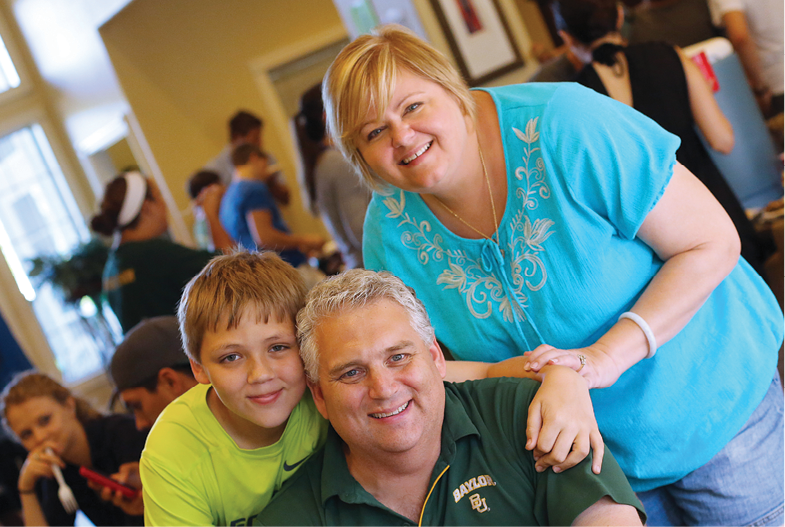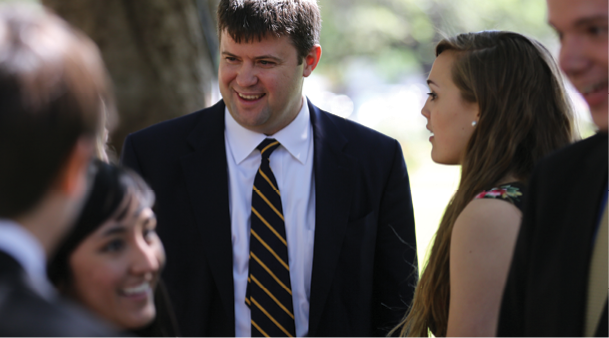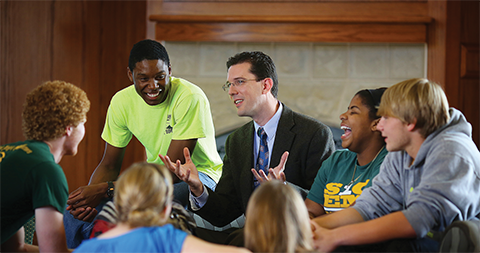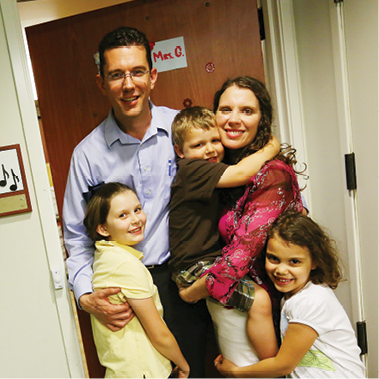Life on the Hall
While the overarching goals for faculty living on campus are the same, each professor and residence hall has its own dynamic, its own "fingerprint," according to Dr. Ian Gravagne. For instance, Brooks College and University Parks house students from a variety of majors, while Gravagne's assembly, which is moving from North Village to East Village, is geared toward engineering and computer science majors. // Life unquestionably changes for a professor who moves into a residence hall alongside hundreds of 18- to 22-year-olds -- all the more so for those with spouses and children. And through their efforts, life -- and even life paths -- also change for the students who live down the hall.
Carson and Kim Mencken
Transfer Year Experience LLC // University Parks Apartments
Dr. Carson Mencken, a sociology professor, and his wife, Kim, a senior lecturer in economics, were drawn to be more involved with their students after leading a study abroad opportunity in Maastricht two years ago, where they developed strong relationships with their students.
A year ago, the Menckens jumped at the chance to play a more intentional role in the lives of Baylor students, moving as Faculty-in-Residence into University Parks, an apartment complex Baylor purchased two years ago and began managing this past year.
Along with their 12-year-old son, Carter, and chocolate lab, Snickers, the Menckens left their 2,400-square-foot home in the suburb of Hewitt for a 1,300-square-foot unit in an apartment building that houses 500 transfer students, student-athletes and academic-minded upperclassmen.
"Frankly, it's been 100 times better than I expected," says Carson. "It's the students, and it's how seriously Baylor takes its commitment to the students, that has made this such a wonderful experience for us. I just love being with the students. They really energize us."
Whether helping students apply for graduate school or gathering to watch football on TV, the Menckens have been able to aid students in a variety of academic and professional ways and encourage social and bonding activities.
"We feel like our role is to try to help them develop community amongst themselves and to give them opportunities to do that, but they are certainly thrilled to include us in that community, which has been really nice -- and a little bit of a surprise," says Kim. "We don't want to be in their business too much, but they want us there."
The familiarity and regularity of weekly events like "Meat and Mingle," during which the couple prepares a Sunday evening home-cooked meal and serves all the residents who choose to attend, up to 70 at a time, blurs the lines between the academic and the social. While enjoying sausage and pancakes, lasagna, and jambalaya, the students bond with the Menckens and with each other.
"I get asked, 'Can you explain diminishing marginal returns to me, please, Mrs. Mencken?' as I'm serving them dinner," says Kim. "Several of the girls give me a hug every week when they come in, and that's really nice. They treat us like surrogate parents."
That Sunday night meal "is a tremendous effort on their part," says junior resident Matthew Reddick. "They know that the key to students' hearts is through their stomachs, especially when it is a quality, home-cooked meal that brings stress relief and a time away from the books every Sunday evening. Even if your upcoming week is going to be rough, you know that the Mencken family has a meal ready for you. Along with the meal, Carson and Kim both allow you to see the faculty away from the traditional faculty role. The little comforts that they both provide made a huge difference in our day-to-day lives as students."
"Baylor really, really cares about its students," affirms Carson. "I always knew that as a faculty member, but being a Faculty-in-Residence, I see that even more so. It's our comparative advantage. Without that kind of support system, we would not have been nearly as successful. This is a big part of what makes Baylor, Baylor."
Todd Buras
Honors residential college // Memorial and Alexander halls
Dr. Todd Buras and his wife, Allison Germer Buras, BA '92, were just looking for the next step in their pursuit of Christ. They found it in Baylor's Honors Residential Community (HRC), housed in Memorial and Alexander halls, where Dr. Buras is Faculty Master. He and his wife reside there with their three boys, Benjamin (12), Jonathan (9) and Michael (7), and a dog, Berkeley.
"This looked to us like a natural and good step to live together as Christians in a way that forms us as whole persons, even though in some respects, it's highly unusual to live with 325 18- to 22-year-olds," says Buras, an associate professor of philosophy.
"This experience has been a revelation for me -- and a revolution, really. Before I lived in this community, I didn't have much of a vision for all the ways that a faculty member might be involved with students, and all the things that they might want to talk to faculty about."
One such conversation started in Buras' First Year Seminar, which is a New Student Experience course for freshmen. The conversation on faith and reason raised large, philosophical puzzles about the problem of evil, heaven and hell, and God's justice and grace.
"That particular conversation with one of the students would pick up and carry on, not just after class, but we would meet at coffee hour in the HRC every Monday at 4:00, and we could just pick up exactly where we had left off. We kept that conversation going in class, and out of class, and back and forth. It was quite a dramatic experience for me, to see the kind of power of the interaction, to just reinforce and collaborate. ... It's a good example of a formative Christian intellectual community.
"Topics like the problem of evil, of understanding God and justice, are not really things you can resolve in a classroom. They're things you struggle with as a member of a community, to think intelligently about it, and coherently about it, and to resolve, to make peace with, really."
That impact can especially hit home for students going through difficult life experiences, like what sophomore Ali Groves experienced this past year while living in Memorial.
"When I came to Baylor, my dad had recently passed away, leaving me with a lot of doubts about Christianity and questions regarding the problem of evil," she recalls. "After spending time at Baylor, I also realized I did not know much about Christianity other than the mixed messages our society puts forth. I was therefore overflowing with questions.
"Dr. Buras generously spent many hours discussing my concerns and answering my questions about the Christian faith. These conversations were the first time I became aware of the idea that faith and reason are not opposites of each other but can actually exist in harmony together. It was not until coming to Baylor and talking with Dr. Buras that I realized Christianity is not just for those who abandon their reason so that they can believe in its message. I learned that the Christian faith is, in fact, reasonable. Through these discussions I have also come to learn more about Christianity and started to come to peace with many of the questions I have."
Buras knows formative intellectual conversations among Christians, about faith and life, happen on and off campus all the time.
"What I think we achieve by these collaborative Living-Learning programs is to see to it that it happens much more often, and with as much support as we can give it, to make it as good as possible. We're trying to capture the energy that's going to be there, and direct it to help it grow, blossom and be fruitful."
Ian Gravagne
Engineering and Computer Science LLC // Gordon Teal Residential college, East Village
Early in his career, one of Dr. Ian Gravagne's fellow professors was frustrated by interruptions from students and colleagues.
"Then it dawned on him that those interruptions were his work," relates Gravagne, an engineering professor at Baylor since 2002. "As a believer, they ought to be his work. The people who God was putting in his path and bringing to his door -- the colleagues who were lingering a bit longer than necessary, the students who just wanted to talk -- were his work.
"That example really shaped the way I approach this job as a Faculty-in-Residence. I obviously have things I need to do as a faculty member, as a teacher, a researcher, and a scholar, but at the same time I really began to view the students and their lives as part of that work, not as an addition or tangential component."
Gravagne spent the last two years as a Faculty-in-Residence in North Village; this fall, he will transition into a new role as Faculty Master for the newly opened Teal Residential College in East Village, with a population of primarily engineering and computer science majors. As a trusted mentor, Gravagne has been asked to share advice on relationships and families, careers, family illnesses, cancer and death.
"There are opportunities that come up where students really are searching for some deeper understanding on what their purpose in life is and what Jesus Christ had to say about that, and so we'll talk as much as they want about that."
Freshman Sarah McCarty lived in North Village this past year and says she has both sought out and benefitted from Gravagne's advice on both academic and spiritual matters.
"Dr. Gravagne is an intelligent, godly mentor who invests in our lives," she says. "It contributes to the closeness of our community to see him and his family at all our events, to play 'duck duck goose' with his children in the lobby, and to eat donuts with him while discussing the world every Friday morning. He genuinely cares about each one of us. He helps hold us together and contributes to making us who we are."
Because Gravagne's group is a bit more homogenous in terms of academic major, he steers his programming to expose students to the idea of college as a broad place of intellectual exploration. For instance, his residence have read and discussed books like Screwtape Letters and Mere Christianity, which Gravagne says opens up lots of opportunity for deep reflection.
"Interestingly enough, many of these very technically astute students are at least initially concerned that if they use that knowledge and those patterns of thought to really begin to analyze the tenets of their Christian faith, that it will weaken their faith. But one of the most enjoyable aspects of this job is getting to see several who have gone through the 'ah ha!' moment, where they say, 'Wow, this Christianity thing is really deeper than I thought, and there are lots of interesting questions which I can delve into and use my technical and logical skills to analyze and understand and deepen my relationship with God through that.'"
He admits to struggling to find boundaries between "work and not work," as he is joined in the residence hall by his wife, Ann, and their children, Gina (9), Lydia (6) and Ray (3). And there's no denying that the role is both time and energy consuming, but Gravagne says he's glad that Baylor has professors who do have that desire.
"Anybody who does this job has to be prepared to think of everything they do as a vocational calling in some way," he says. "You can't do this forever, but my life is different in relationship to my students because I am in the position to just simply know them better -- their history, hopes, struggles, and dreams."




